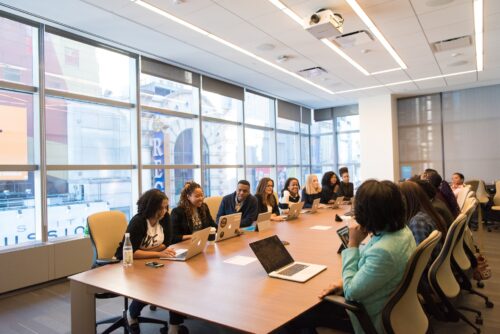The ability to bounce back from setbacks, cope with stress, and maintain a positive outlook is what sets high-performing individuals apart. Developing resilience is not a one-time event; it’s a continuous process that requires practice, perseverance, and a growth mindset. With the right strategies and mindset, anyone can develop resilience and thrive in the workplace. In this article, we’ll explore some amazing strategies for building resilience that you can start applying today. From cultivating a support network to practicing self-care, we’ll cover a range of proven techniques that will help you stay calm, focused, and resilient, even in the face of adversity. So, whether you’re an employee looking to enhance your resilience or a manager seeking to foster a resilient team culture, read on to discover some powerful tips and tricks for developing resilience at the workplace. Before we talk about developing resilience at the workplace, let’s look at the resilience meaning.
Do you know what resilience meaning?
Resilience meaning the individual’s ability to recover rapidly from difficulties, and bounce back.
Resilience is the attribute of one being able to recover and adapt quickly from a challenging event or stressor at work. In other words, it’s a kind of inner strength. Resilience in the workplace can support the workers or employees to rise from the challenging experiences. Developing resilience in the workplace can also assist the growth and professional development of personnel.
Developing a Resilient Mindset is a key strategy that helps employees tackle and overcome stress, competitive tasks, workplace conflicts, and address challenges on the assignments. Work is the number one stressor in the lives of most people around the world. Developing resilience in the workplace can improve business performance, reduce claims, reduce high staff turnover and improve the stakeholder relationships (clients, customers, internal staff).
Most people consider themselves as being resilient when they think they possess the below characteristics:
- Feeling confident and those who believe in themselves.
- Always possess a positive attitude despite adverse circumstances.
- Deal with equal poise in easy as well as tougher situations.
- Devoid of negative attitude despite criticism.
Let’s test ourselves: If your boss informed you that, you need work on your project as it is not up to scratch? What will be your response?
- I am stressed, I have so much pressure
- I hate my boss
- I will calm down and talk to my boss
- I am not paid enough
- I didn’t get training about project management, what do they expect!
- It is my boss’s fault
- Ask your boss why? And ask for assistance?
- Things will get better once I submit the project.
The Importance of Resilience in the Workplace
Resilience is the ability to adapt to change, overcome adversity, and recover from setbacks. At the workplace, resilience is essential for managing stress, maintaining productivity, and achieving long-term success. Research has shown that resilient individuals are better equipped to handle job demands, cope with job loss and uncertainty, and maintain a positive attitude in the face of challenges. Moreover, resilient employees are more likely to take on leadership roles, build strong relationships with colleagues, and contribute to a positive work culture. In today’s dynamic and competitive work environment, resilience is no longer a luxury but a necessity for success.
Factors that Influence Resilience
Resilience is not a fixed trait but a dynamic process that can be developed over time. However, several factors can influence a person’s resilience, including genetics, environment, experiences, and mindset. For instance, individuals who have experienced significant trauma or adversity may be more resilient than those who have not faced similar challenges. Moreover, individuals who have a positive outlook, high self-esteem, and social support are more likely to develop resilience. On the other hand, individuals who have a negative mindset, low self-esteem, and lack social support may struggle with resilience. While some factors may be out of our control, we can take steps to cultivate resilience through intentional practice and mindset.
Strategies for Developing Resilience in the Workplace
Building a Support System
One of the most effective ways to develop resilience is to build a support system. Having a network of colleagues, mentors, friends, and family members who can provide emotional, social, and practical support can help us cope with stress and overcome challenges. A support system can also provide us with different perspectives, advice, and feedback that can help us grow and learn. To build a support system, start by identifying individuals who you trust and respect, and who can offer you different kinds of support. This can include colleagues who share your values and interests, mentors who can offer guidance and feedback, and friends and family members who can offer emotional support. Make time to connect with your support system regularly, whether it’s through social events, coffee breaks, or virtual meetings.
Developing a Growth Mindset
Another key strategy for developing resilience is to cultivate a growth mindset. A growth mindset is the belief that our abilities and qualities can be developed through dedication and hard work. Individuals with a growth mindset are more likely to embrace challenges, learn from feedback, and persist in the face of setbacks. To develop a growth mindset, start by reframing your self-talk from a fixed mindset to a growth mindset. Instead of saying, “I’m not good at this,” say, “I can improve with practice.” Instead of saying, “I failed,” say, “I learned from my mistakes.” Challenge yourself to take on new challenges, seek feedback, and focus on the process rather than the outcome.
Practicing Self-Care
Practicing self-care is another essential strategy for developing resilience. Self-care involves taking care of our physical, emotional, and mental health through intentional practices such as exercise, healthy eating, mindfulness, and relaxation. Self-care can help us manage stress, boost our mood, and improve our overall well-being. To practice self-care, start by identifying activities that bring you joy and relaxation, such as going for a walk, listening to music, or practicing yoga. Make time for self-care regularly, whether it’s daily, weekly, or monthly. Remember that self-care is not selfish but essential for our well-being and resilience.
Building Resilience through Mindfulness and Meditation
Mindfulness and meditation are powerful tools for building resilience. Mindfulness is the practice of being present, non-judgmental, and accepting of the present moment. Meditation is the intentional practice of focusing our attention on a particular object, such as our breath, and observing our thoughts and emotions without judgment. Both mindfulness and meditation can help us manage stress, reduce anxiety, and improve our focus and clarity. To practice mindfulness, start by taking a few minutes each day to focus on your breath and observe your thoughts and emotions without judgment. To practice meditation, find a quiet and comfortable space, set a timer for a few minutes, and focus on your breath. Over time, you can increase the duration and frequency of your practice.
Overcoming Setbacks and Challenges
Finally, one of the most important strategies for developing resilience is to learn how to overcome setbacks and challenges. Setbacks and challenges are inevitable in the workplace, and learning how to cope with them can help us grow and become more resilient. To overcome setbacks and challenges, start by reframing them as opportunities for growth and learning. Instead of seeing them as failures or obstacles, see them as chances to develop new skills, learn from mistakes, and build resilience. Seek feedback from colleagues and mentors, and use it to improve your skills and performance. Remember that setbacks and challenges are not the end of the road but a detour on the path towards success.
Guidelines to developing resilience in the workplace:
- Build genuine connections
- Prioritise relationships in terms of quality. Connecting with empathetic and understanding people can remind you that you’re not alone in the midst of difficulties.
- Be a good communicator
- Improve your problem-solving skills
- Improve your goal setting skills
- Have gratitude
- Help and support others.
- Develop and maintain a proactive attitude.
- Aim and move toward your goals.
People who are developing a resilient mindset, are those people who have a firm belief in their ability, knows their strengths and weakness, are aware of situations, their own emotional reactions, and the behaviour of those around them. As a result of this, they can maintain control of a situation and think of new ways to tackle problems. Research has proved that resilient people emerge stronger after such difficulties.
Developing resilience in the workplace
It is a unique attribute and very much a personal journey that takes self-reflection, time, and practice. However, resilience can be moulded and motivated by team leaders and managers who can support an individual’s development by providing the right tools and resilience training. Organisational resilience is facilitated at the management level where the senior level also promotes organisational resilience, making it a work-wide culture. This reassures and motivates employees to commit their dedication to learn and develop their abilities to enhance workplace resilience.
Check out our Developing a Resilient Mindset training program. We have a multi-tier assessment at this program. We will need 5 designated people from your workplace (5 will be enough, +5 results not will change). People that you have designated will be sent a questionnaire about your resilience at work, and you will be sent a questionnaire about your resilience. Then we will provide you a detailed profile about your resilience. During the 1 day training we will work on positive mindset, working on our strengths.
We are certified trainer’s for TRACOM™© – Developing a Resilient Mindset. Contact us for more information on Developing a Resilient Mindset, we can provide this program, online, onsite and in our public training programs. We are happy to travel across Australia. International clients are welcomed as this program is a fantastic training that will build on your existing skills.
Conclusion: Embracing Resilience as a Lifelong Skill
In conclusion, resilience is a crucial skill for success in the workplace. By developing resilience, we can learn how to cope with stress, developing a resilient mindset to overcome setbacks and challenges, and maintain a positive outlook. Building resilience requires intentional practice, a growth mindset, and a support system. By cultivating these strategies, we can become more resilient and thrive in the face of adversity. Remember that resilience is not a one-time event but a continuous process that requires perseverance and mindset. Embrace resilience as a lifelong skill, and you’ll be better equipped to handle whatever challenges come your way.
Access Psychosocial Hazards Books from Amazon: Psychosocial Hazards












